Reviews of "The Creator," "A Million Miles Away" and "Kenyatta," as well as a podcast preview and two film festival wrap-ups, are all in the latest Movies with Meaning post on the web site of The Good Media Network, available by clicking here.
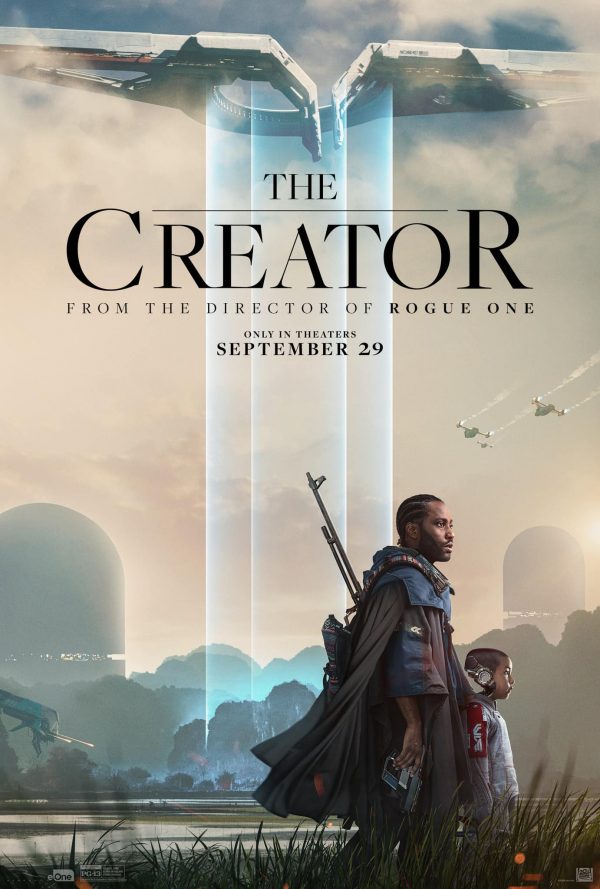
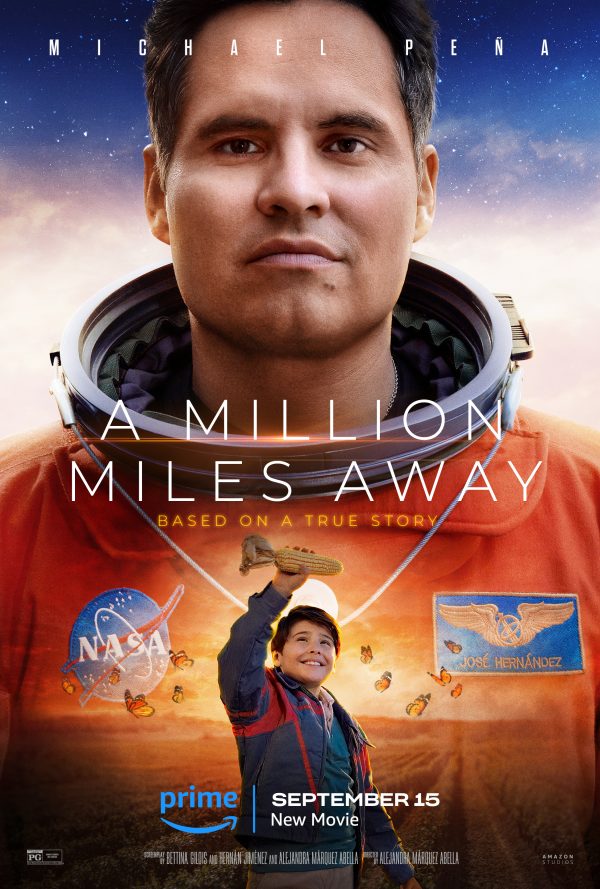



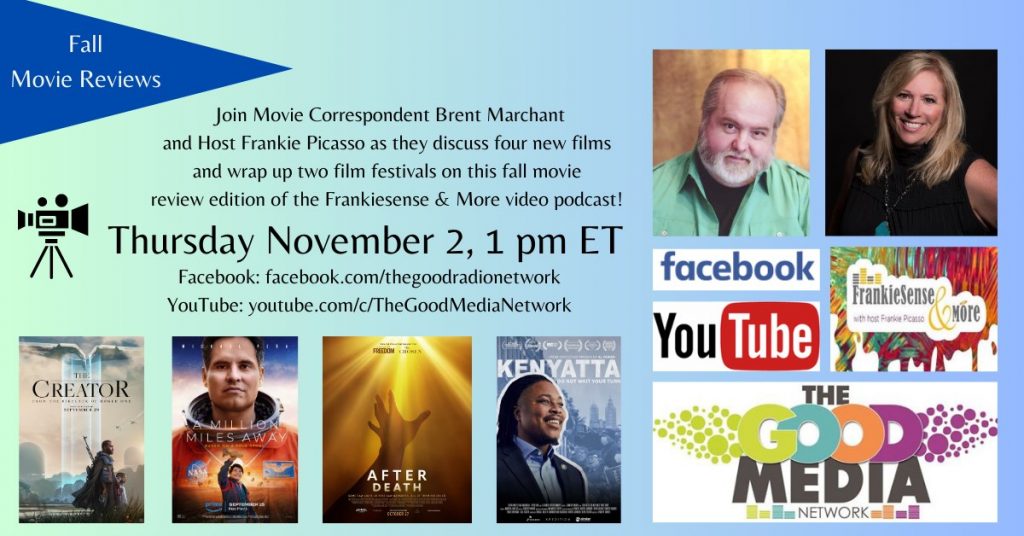
Reviews of "The Creator," "A Million Miles Away" and "Kenyatta," as well as a podcast preview and two film festival wrap-ups, are all in the latest Movies with Meaning post on the web site of The Good Media Network, available by clicking here.







“Kenyatta: Do Not Wait Your Turn” (2023). Malcolm Kenyatta, Matthew Jordan-Miller Kenyatta, John Fetterman, Conor Lamb, Lee Daniels, Holly Otterbein, Mary Kenyatta, Chardae Jones. Archive Footage: Muhammed Kenyatta. Director: Timothy Harris. Web site. Trailer.
That support is largely driven by his outspoken nature, someone who’s not afraid to say his piece and does so with a no-nonsense yet eloquent, highly articulate manner. What’s more, given his working class upbringing, he can relate to the kinds of challenges faced by the economically challenged constituents in his district. He knows what they’re experiencing, because he’s had to contend with such issues himself. And, considering his sexual orientation and minority status, he has had to fight for recognition on these fronts, something that has steeled his resolve to push for the rights that he and others in the LGBTQ+ and African-American communities have been denied but deserve. He advocates passionately in these areas, insisting that everyone should have access to life’s basic necessities and equal rights without having to struggle to simply get by.

That kind of activism is in Kenyatta’s blood, too. His grandfather, Muhammed Kenyatta (born Donald Brooks Jackson, 1944-1992), was an ardent civil rights advocate and an organizer for the Head Start program, which provided early childhood education and health care services to impoverished minority children and their families. It’s an influence that apparently rubbed off on the younger Kenyatta, who became an organizer of student protests against educational budget cuts while he was in college. Subsequently, in 2017, at the age of 27, he announced his plan to run for the Pennsylvania House of Representatives, an election he handily won a year later, becoming one of the youngest candidates ever to win and serve in the state’s legislature.
Kenyatta endured some homophobic pushback during the primary associated with that first campaign, but it ended up not having much impact in the general election, where he captured a whopping 95% of the vote. He sees himself as an out-and-proud gay man, empowered in who he is and in his relationship with husband Matthew Jordan-Miller Kenyatta. The duo quite obviously has a deeply loving partnership, as evidenced in scenes of their everyday personal life and from their joyous wedding ceremony. This footage thus reveals yet another aspect of Kenyatta’s authenticity that has consequently translated into avid support from his followers.
In 2021, Kenyatta made the decision to tap into the wellspring of goodwill he had built up by making a run for the US Senate from Pennsylvania in the 2022 midterm election. This campaign makes up the bulk of the film, showing the candidate in efforts to ambitiously widen his name recognition on a larger political stage. It documents the challenges the candidate faced with financial difficulties, exaggerated questions of electability, biased punditry and media coverage, and a lack of support from his own party’s officials, including in his home district of Philadelphia. Nevertheless, these obstacles did not stop Kenyatta from soldiering on with his own style of out-and-proud, shoot-from-the-hip style of politicking, especially against his two better-known, better-financed, more widely recognized Caucasian opponents, Lt. Gov. John Fetterman and US Rep. Conor Lamb, both of whom bested him in the Democratic primary. But Kenyatta’s loss in the Senate race didn’t knock him out of politics. His name remained on the ballot for State Representative, running unopposed and handily winning reelection, where he continues to serve. And, since completion of the film, he has announced his candidacy to run in the 2024 statewide election to become Pennsylvania’s Auditor General.

What’s perhaps most inspiring about Kenyatta’s story, though, is his beliefs in his abilities, his ambitions, his policies and himself, qualities that come through loud and clear in this documentary. And those traits, in turn, have become beliefs in him in the minds of supporters, including those outside his home state, such as filmmaker Lee Daniels, who hosted a fundraiser for Kenyatta during his Senate campaign with the backing of Hollywood influencers. It’s no wonder Kenyatta is being looked on as a rising star in his party, someone whose name is likely to be around for a while, both in Pennsylvania and beyond its borders.
The significance of these beliefs can’t be emphasized enough in light of the role they play in the manifestation of his existence, just as they do for all of us. This is a product of the conscious creation process, the philosophy that maintains we draw upon the power of these intangible resources in shaping the nature of our reality. It’s not apparent whether Kenyatta has heard of this school of thought, but, given the sincerity of his intentions and the track record that has come from them, it would seem he’s well practiced in its principles and their application.
Considering Kenyatta’s accomplishments thus far, he’s achieved an impressive record of success, even though not all of his ambitions have been realized as yet, such as his campaign for the US Senate. Nevertheless, the experience gained from such an endeavor provides beneficial life lessons for how to carry out future undertakings. He can thus build on that information in fine-tuning his beliefs for the opportunities that emerge down the line. He’s young, after all, and few of us attain our biggest achievements in our initial attempts. However, the wisdom that comes from such experiences frequently enables us to hone our beliefs and the skills that come out of them in tackling those greater challenges.

The strength of Kenyatta’s sustained resolve is especially noteworthy, another product of his beliefs. He’s zealously committed to his platform but also to encouraging others to follow his lead. In fact, as evidenced by one of his speeches in the film, he passionately urges his supporters to step up and take their rightful place. While he freely acknowledges the social and political progress that members of the minority and LGBTQ+ communities have made over the years, he also makes it clear that those who have come out of backgrounds like his shouldn’t have to sit back and wait for the opportunities to be bestowed upon them. He believes that such individuals should willingly step forward to pursue what they contend is theirs. In essence, as the picture’s subtitle espouses, he issues the rallying cry, “Do Not Wait Your Turn.” Indeed, patience may be a virtue, but there comes a time when it can run out, no matter how much belief support it may have.
One of the assets that will undoubtedly help him – just as with any charismatically inspiring leader – is the growth in support he has received from his followers. In the end, they play just as important a part as he does in the attainment of his success. By working with him, they’re also working for themselves in the pursuit of their shared objectives. And this is possible because of the beliefs they have in him, his platform and the goodwill he generates, a prime example of an act of collaborative co-creation. By joining forces and working together in this way, they have an enhanced opportunity for seeking the fulfillment of their mutual goals. This is indeed a win-win situation for all.
Given the challenges that Kenyatta and other politicians like him face in their ventures, one might wonder why they would willingly take on such arduous pursuits. But, as becomes apparent through this film, Kenyatta does so because he genuinely believes that it’s the right thing to do, an expression of the destiny he’s meant to live out, what some practitioners of this thinking call their value fulfillment. As depicted here, Kenyatta appears committed to his goals – and to the good that they can provide to all of his constituents and, maybe one day, to all of us.
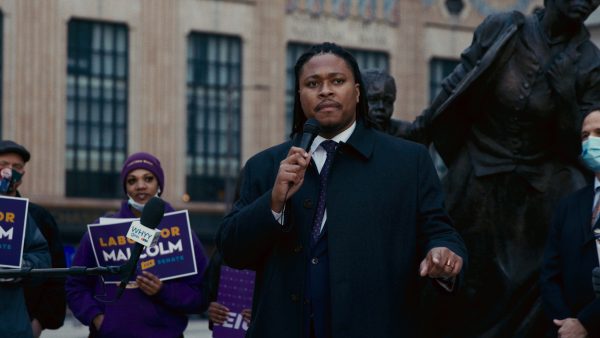
In an age when politicians on both sides of the aisle are increasingly being seen as incompetent, self-serving and inauthentic, it’s refreshing to learn about one who apparently defies all of those traits, and viewers can now learn more about this inspiring individual in director Timothy Harris’s excellent debut documentary feature. The film charts the obstacles its protagonist has faced, but it also shows that he’s more than just a politician. This profile showcases that he’s also an individual whose experiences, upbringing and personal life have shaped his policies and the apparent authenticity of his message, one driven by compassion, heartfelt sincerity and a growing intolerance of a system that seems hellbent on preserving a status quo that’s ever more exclusionary than not. This well-balanced, superbly integrated approach makes for excellent documentary filmmaking, giving audiences a comprehensive view of its subject and reason to see why he could easily be looked on as a rising star in American politics, one who speaks for many who don’t feel that their voices are being heard by the current establishment. Executive Producer Al Roker and his colleagues have created an insightful, uplifting watch, one that may actually give us some bona fide hope for the future of the nation’s politics – not to mention the nation itself.
Finding this film may be a little difficult at present, given that it’s primarily been playing the LGBTQ+ and documentary film festival circuits. However, considering that Kenyatta is gearing up for another campaign and the fact that the production has the backing of a high-profile executive producer like The Today Show’s Al Roker, it’s hard to imagine this release not receiving wider distribution at some point. Check the film’s web site for updates.
Some viewers might claim that this picture is little more than a piece of liberal political propaganda, and, admittedly, that’s an argument that could be seen as having some merit. However, given the deplorable state of American politics at the moment at virtually every level of government and leadership, we can use all of the help we can get, particularly when it comes to inspired solutions that can cut through the clutter, nonsense and juvenile partisanship that keep our society locked in place and mired in its problems with little hope of resolution. And, because of that, we should keep our options – and our minds – open to look for ways to make progress happen. The least we can do is listen to what visionaries like Kenyatta have to say in the hope that they can help lead us out of our current circumstances. There’s too much riding on this not to do so.
Copyright © 2023, by Brent Marchant. All rights reserved.
Tune in for the latest Cinema Scribe segment on Bring Me 2 Life Radio, beginning Tuesday October 24, available by clicking here. You can also catch it later on demand on Spreaker, Spotify, Apple Podcasts, iHeartRadio, Podchaser, Audible, Deezer, Podcast Addict and Jiosaavn.
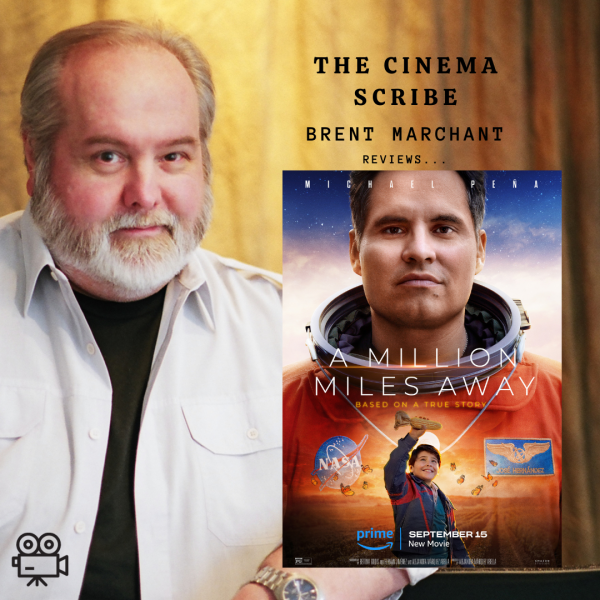
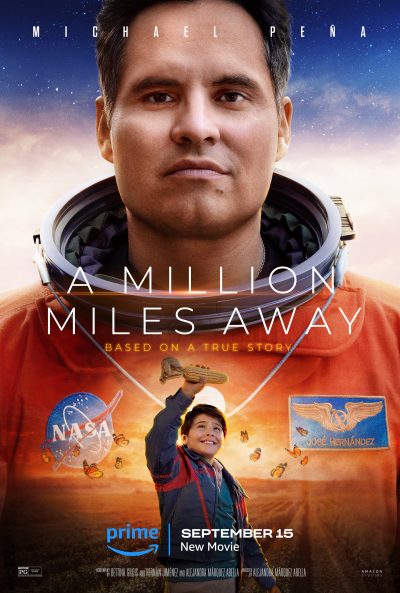
“A Million Miles Away” (2023). Michael Peña, Rosa Salazar, Julio Cesar Cedillo, Veronica Falcón, Bobby Soto, Juan Pablo Monterrubio, Michelle Krusiec, Garret Dilahunt, Jordan Dean, Eric Johnson, Sarayu Blue, Emma Fassler, Leonardo Granados. Director: Alejandra Márquez Abella. Screenplay: Bettina Gilois, Hernán Jiménez and Alejandra Márquez Abella. Book: José Hernández, Reaching for the Stars: The Inspiring Story of a Migrant Farmworker Turned Astronaut. Web site. Trailer.

However, as someone who came from such an economically challenged background, how could José realistically see his dream of becoming an astronaut realized? Thankfully, Miss Young’s encouragement, his cousin Beto’s ongoing support and his avid viewing of moon landing TV coverage did much to inspire him. But perhaps José’s greatest inspiration came from his father, who told him he could achieve anything as long as he had a plan in place to do so. Salvador outlined a five-point program that José embraced and put into practice, one that eventually enabled his older self (Michael Peña) to move ahead with his objective.
Having successfully earned a college degree as an engineer, José landed a position at the Lawrence Livermore Laboratory. But, even with such a prestigious pedigree to his name, he initially faced his share of challenges in this environment. After all, in those days, minority professionals were still few and far between in organizations like that. He was even initially assumed by some to be a new member of the facility’s custodial staff. However, through a string of fortuitous synchronicities in which he was able to demonstrate his considerable expertise, he managed to get noticed and steadily began rising through the ranks of the engineering staff. That kind of attention subsequently helped open the door to NASA, which, in turn, put him in touch with opportunities to try out for the astronaut training program.
Joining the astronaut training corps was easier said than done, however. José soon learned that he needed more skills than just his engineering background and accomplishments at Livermore. He needed to develop additional aptitudes educationally, as well as the state of his physical condition. This wasn’t easy given the fact that he was now getting older and was attempting to do all this while holding a full-time job and being a husband and father of five. His 11 applications to the astronaut training program were all rejected, raising doubts whether he’d ever qualify for admission.

José’s pursuit of his goal led to strain in his family life as well. His wife, Adela (Rosa Salazar), became frustrated that she had to shoulder the lion’s share of the household duties and that her dreams of opening a restaurant of her own were continually put on the back burner. These difficulties and the potential costs to his marriage prompted him to wonder whether the dream was worth it. But, when Adela confronted him about continuing his quest, she agreed to go along with it as long as he remained serious about it – and that, if he wasn’t, he should give it up for good. With his wife’s renewed support and the ongoing encouragement of his family (most notably his grown-up cousin Beto (Bobby Soto)), José forged ahead.
After his many denials, José decided to take a different approach when it came to submitting his 12th application: He hand-delivered it in person to Clint Logan (Eric Johnson), the NASA official in charge of reviewing candidate applications. That kind of ambition – the sort of “can do” attitude that had come to characterize the space agency over the years – won over Logan, despite José’s long string of rejections. He was thus accepted into the program. But, with so many participants selected for training, there was still no guarantee that he would be chosen to go into space.
The training that José underwent was just as arduous (if not more so) than anything he endured in preparing for the program. But, once again, he had support to keep him motivated, especially Kalpana Chawla (Sarayu Blue), a former Space Shuttle crew member now in charge of overseeing candidate training. She recognized José’s gumption and urged him to remain vigilant, telling him that there was nothing like seeing Earth from the heavens above. Her words inspired him, especially when she added that she had been selected for a return to space aboard a flight of the Space Shuttle Columbia scheduled for early 2003.

Through all of his training, the exhilaration of space flight kept José going. But the Columbia disaster in which his friend Kalpana was killed opened his eyes to the potential dangers involved in such ventures. It also raised new doubts for Adela, who wanted to see her husband’s dream realized but did not want him to perish because of it. And, with the Space Shuttle program put on hold after the Columbia’s tragic re-entry accident, it was unclear if José would ever get to reach for the stars.
Still, José remained hopeful, despite the many delays, the anguish of losing his friend and his wife’s concerns. And, somewhat unexpectedly, he eventually got his shot in 2008, when he was named a mission specialist for an August 2009 flight aboard the Space Shuttle Discovery. It was a long journey from the California migrant worker camps to the International Space Station. But it’s proof that dreams can indeed come true as long as we believe in them – and make the effort to see them realized.
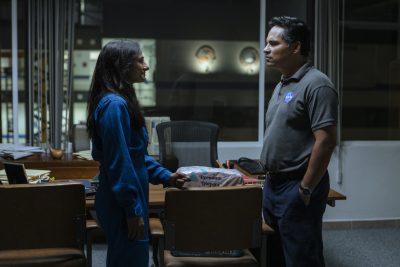
Considering where José began his life and where he ended up, he indeed traveled a million miles, both metaphorically and literally, from where he started. And that journey was fueled to a great degree by the beliefs propelling his odyssey. In light of that, there’s much to be said for the power and persistence behind the intents that got him there. Even at those times when he was tempted to give up, the reinforcement of those beliefs – thanks to the fortification of his own resolve and the encouragement of others – kept him going.
This is crucial to bear in mind when we may feel like abandoning our aspirations. As conscious creation practitioners are well aware, doubt, fear and contradiction are the forces that can most readily undercut the functioning of this process. However, by vanquishing those potentially undermining influences, we can keep going, as José’s experience so clearly shows.
As uplifting tales of inspiration and motivation, movies about underdogs and beating the odds have become increasingly popular in recent years, especially when based on true stories. And this latest Amazon Prime Video production is yet another offering to come out of that genre. Writer-director Alejandra Márquez Abella’s biopic chronicles the impressive journey of a migrant farm worker-turned-astronaut. The film provides a comprehensive view of this unlikely hero’s life from his often-disrupted childhood to his impressive space-faring explorations, an uphill battle during which the odds were often stacked against him, both professionally and as a dutiful husband, father and son. It’s a moving story, the kind of picture that makes a good viewing choice for impressionable, wide-eyed grade school students with big dreams of their own.
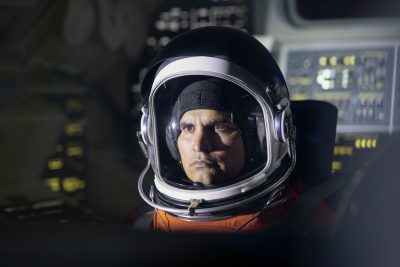
However, despite these strengths, the film has some issues working against it. The narrative is rather formulaic in its storytelling approach, precisely hitting all of the requisite high and low points in just the right amounts and at just the right times, making the story somewhat predictable, at times blatantly so. The screenplay also takes some liberties with the timeline of actual events, despite its contention of being fact-based. And the picture is also a little on the long side; in its sincere attempt to be thorough, it sometimes incorporates so much detail that the story’s more incidental moments start to bog down the flow of the film. To its credit, though, this release also has its delightful moments of unexpected humor and features fine performances by its capable cast, even if the material they’ve been given to work with at times seems a little conventional. “A Million Miles Away” is certainly an enjoyable watch, but don’t be disappointed if you don’t quite feel like you’ve been rocketed into orbit by the picture’s end.
In an age as cynical as ours can be at times these days, it’s refreshing to still have inspiring, heroic stories out there that uplift us and give us encouragement for the fulfillment of our dreams. We may not all have aspirations as big as those of this film’s protagonist, but it’s comforting to know that the message of this picture can trickle down to each of us in our own respective ways. Reaching for the stars need not be a literal objective, but the metaphor may well be enough for many of us – and its fulfillment can be just as satisfying in the end.
Copyright © 2023, by Brent Marchant. All rights reserved.
As this year’s edition of the Chicago International Film Festival winds down, I’ve completed my screenings for 2023. I viewed seven films in all, which is considerably fewer than in recent years, for a variety of reasons (cost, venues, programming), and I must admit I’m coming away from the event somewhat disappointed. This was not one of CIFF’s better efforts, both for the foregoing reasons and for some staging and logistical issues that left much to be desired, especially given a hefty increase in ticket prices. And, as for the films I watched, with two exceptions, I was somewhat underwhelmed by them (somewhat ironic given that the ones I liked most were the first two screenings I attended – what a letdown considering what followed).
With that said, then, here’s what I watched and what I thought of those films:
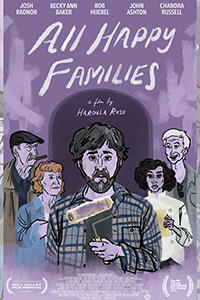
“All Happy Families” (USA)
(5/5); Letterboxd (4.5/5), Imdb.com (9/10), TMDB.com (4.5/5); Web site
Movie portrayals of family life often leave much to be desired when it comes to authenticity (especially for offerings on the Hallmark Channel). So it’s genuinely refreshing when a film comes along that depicts these stories with honesty while being eminently entertaining at the same time. Such is the case with writer-director Haroula Rose’s second feature outing about a dysfunctional Chicago family going through a variety of transitions that become ironically (and often hilariously) interconnected, all served up with sparkling wit and an excellent array of one-liners that are definite zingers without being hurtful or nasty. The construction of the narrative and its accompanying screenplay are meticulous and economical, moving along with a steadily sustained pace and never getting bogged down by prolonged sequences that languish or lose their zest, much in the style of director Nicole Holofcener’s works. All of this is brought to life by a finely assembled ensemble cast, especially its four principals (Josh Radnor, Rob Huebel, John Ashton and Becky Ann Baker) but also in its palette of intriguing supporting players. What’s more, the film does a superb job in its depiction of Chicago’s people and neighborhoods, presenting an authentic look and feel of the Windy City, one that residents of the Second City will relish and appreciate. “All Happy Families” is one of those offerings that aren’t widely seen (or made) anymore, but it’s one of the best I’ve screened in a long time. This charmer deserves a general release and a robust fan base. Let’s hope it gets both.

“The Hypnosis” (“Hypnosen”) (Sweden/Norway/France)
(4/5); Letterboxd (4/5), Imdb.com (8/10), TMDB.com (4/5) Web site Trailer
Sometimes we can all use a little help in changing our behavior when we aren’t able to do so on our own, and hypnosis is one of the most commonly employed practices. But, in some cases, it can work so well that we may unintentionally end up overcompensating, prompting us to act out in ways that yield a whole new crop of issues to contend with. Such is the case with Vera (Asta Kamma August), who gives hypnosis a try to quit smoking, a behavior she regards as unhealthy and antisocial. However, Vera’s hypnotherapist (Karin de Frumerie) suspects that her patient’s reluctance in explaining her reasons for seeking out treatment suggests that she’s there for more than just kicking the habit. This hunch leads her to conduct a profoundly impactful hypnotherapy session that produces a radical, albeit somewhat ill-defined, change in her subject’s behavior. And, even though Vera seems to relish the effects of this change, it couldn’t have come at a worse time: just as Vera and her business and romantic partner, André (Herbert Nordrum), are about to plug their new commercial venture to a group of select international investors at an elite pitch fest, an event where they receive guidance from a high-profile pitch coach (David Fukamachi Regnfors). During preparation for their presentation, Vera begins acting strangely unpredictably, even disorderly, toward others, including those whom she and André are most trying to win over. So what’s going on here? And what, if anything, can André do to salvage matters before everything falls apart? Writer-director Ernst De Geer’s delightfully quirky debut feature takes a humorously absurdist look at questions of social conformity, particularly when it comes to differentiating behavior that’s gleefully playful from that which is wholly unacceptable, especially in earnestly serious “grown-up” situations. It accomplishes this goal through a captivating mix of hilariously dry wit and cringeworthy drama, one that often makes viewers squirm while questioning exactly what’s going on. In fact, at times, the mix can be perplexing enough that audiences may be uncomfortably puzzled by what’s transpiring on the screen and what the director is going for – that is, until the surfacing of the big reveal, the one that exposes the source behind the emergence of Vera’s erratic behavior, one that plants a rollicking punctuation mark on this often-uproarious offering. Much of the credit for this goes to the film’s fine script and its superb ensemble cast, particularly protagonists August and Nordrum, who play off each other well and create a wry sense of humorously driven dramatic tension. I love movies that make it a point to stick pins in sanctimonious balloons and push over sacred cows, and this one does as good a job at that as I’ve seen in a while. “The Hypnosis” may not be everyone’s cup of tea, but I’m only too happy to take more than a few good sips. Pass the milk and lemon, please.

“La Chimera” (“The Chimera”) (Italy/France/Switzerland)
(3/5); Letterboxd (3.5/5), Imdb.com (7/10), TMDB.com (3.5/5); Web site Film clip
When an English tomb raider (Josh O’Connor) skilled at dowsing uses his skills to hunt down buried Etruscan artifacts, he achieves success at his craft but suffers setbacks when he falls in with the wrong crowd. As a consequence, he drifts through life, trying to find his way (and, ironically enough, a moral footing), an odyssey filled with quirky people and events, a would-be romantic interest (Carol Duarte) with two carefully concealed children, an aging operatic instructor (Isabella Rossellini) skilled at fleecing her “students,” and, of course, his coterie of comical criminal cronies. Writer-director Alice Rohrwacher’s latest tells a delightful fable full of wit, whimsy, colorful characters, high intrigue and its share of surreal moments, all set against the Italian landscape. The film admittedly takes a little time to find its stride, so getting through the opening act will require some patience (editing here would have helped). But, once the picture finds its way, it becomes a fun-filled ride, peppered with absurdist humor and filmed with Fellini-esque cinematography and a production design reminiscent of the famed auteur. With a runtime of 2:10:00, it could stand some trimming (most notably at the outset, as noted above), but this cinematic charmer is a modestly pleasant diversion to watch while stretched out on the couch casually savoring a demitasse of espresso and a plate of biscotti. Godere!
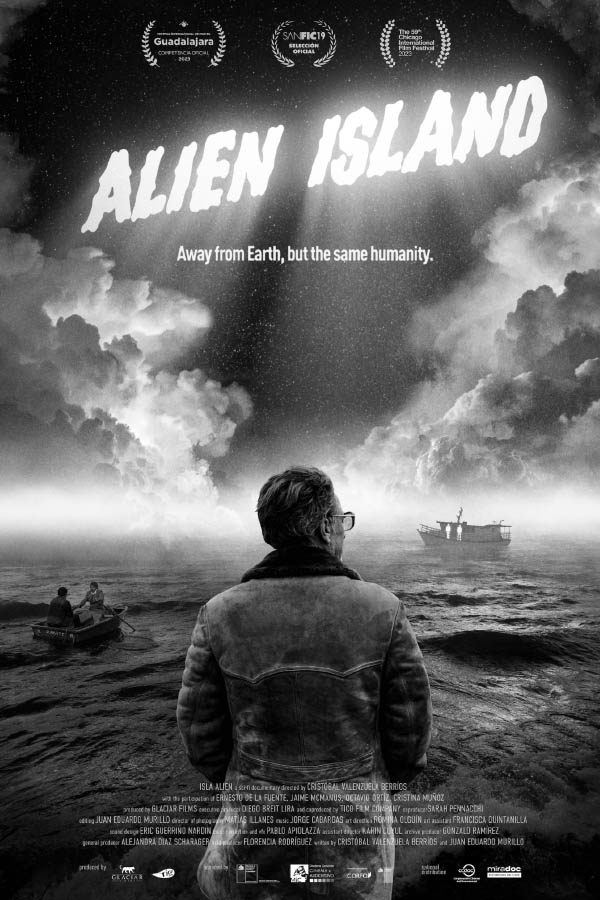
“Alien Island” (“Isla Alien”) (Chile/Italy)
(3/5); Letterboxd (3/5), Imdb.com (6/10), TMDB.com (3/5); Web site Trailer
Urban legends have a way of taking on lives of their own. So it was in Chile in the mid-1980s, when a group of ham radio operators intercepted messages from witnesses who claimed to have seen and interacted with a collective of benevolent, highly advanced extraterrestrials (members of a Pleiadian “congregation” known as “Friendship”) on a remote island off the nation’s far southern coast. But where was the definitive proof of this? The radio messages were about the only available “evidence,” and attempts by investigators to visit Friendship Island always fell through. What’s more, as all of this was unfolding, the nation was in the grips of the authoritarian dictatorship of Augusto Pinochet, a ruling junta known for creating an atmosphere of suspicion and paranoia and frequently spreading disinformation. So what was really going on here? That’s what writer-director Cristóbal Valenzuela Berríos has sought to expose in this highly stylized black-and-white documentary about the fabled, enigmatic Friendship incident. Presented very much in the style of cheesy, campy 1950s horror flicks, the film combines audio recordings of the original ham radio messages, interviews with the short-wave operators who intercepted them, expert opinions from contemporary ufologists and re-enactments of the alleged alien encounters, punctuated by clips from 1990s Chilean TV specials about the incident and select scenes from vintage, low-budget creature features for comic enhancement. However, as well as the film integrates these elements, as the story plays out, it loses some of the humorous, stylistic punch with which it opens, becoming somewhat more mundane and drawn out as its theories about what really happened are explained, moving forward in an increasingly plodding, subdued manner. This portion of the narrative also tends to place too much emphasis on some aspects of its explanation while seriously underplaying others, an issue that undercuts the true impact of its revelations. It’s unfortunate that this offering ultimately progresses as it does, especially since it has a good thing going for it at the outset. Regrettably, though, as one of the screenings I most looked forward to at this year’s festival, instead of mesmerizing me, “Alien Island” merely left me modestly amused and somewhat underwhelmed.

“Bye Bye Tiberias” (“Bye Bye Tibériade”) (France/Palestine/Belgium/Qatar)
(3/5); Letterboxd (3/5), Imdb.com (6/10), TMDB.com (3/5); Web site Trailer
Memorializing one’s family history is an exercise that can provide a valuable record of our relatives’ past and establish the legacy that has carried through the years to the present day. It can also teach us much about what distinguishes one’s kindreds in terms of their characteristics, accomplishments and values. The impact of that can be quite revelatory, too, producing a chronicle of inspiring insights and profound achievements of one’s relations, especially those that emerged in the face of challenge, adversity and cultural limitations. In her second documentary feature, director Lina Soualem has sought to capture a loving record of those qualities in this highly personal film that charts the lives of four generations of her family’s women, including herself, her mother (Emmy-nominated actress Hiam Abbass), her grandmother and her great-grandmother. The picture primarily follows the experiences of the filmmaker’s three ancestral generations during their lives in their Palestinian homeland from the days of the creation of Israel in 1948 to the time of Abbass’s emigration to France, where she began her acting career and gave birth to her daughter. In doing so, the film juxtaposes the family’s individual history with that of the larger cultural backdrop against which their story is set. It also provides viewers with a look at the actress’s return to Palestine with her daughter after a prolonged absence, a time of remembrance and reflection. As touching and uplifting as this story can be, however, there are times when it starts to play more like a highly polished home movie than a theatrical documentary. It also would have benefitted from a deeper look at the historical back story and how its events helped shape the lives of these courageously determined women. That’s particularly true in the wake of recent developments (even though this film was made before them), given that the inclusion of such background material would have leant a more profound understanding to the longstanding prevailing circumstances in Palestine and the role that they played in the unfolding of this family’s story. Moreover, the film seems to puzzlingly downplay Abbass’s career accomplishments, achievements that marked a key turning point in the family’s history, one specifically inspired by her yearning to leave the “suffocating” conditions of life in her homeland. Soualem certainly deserves kudos for her attempt to deftly mesh personal and cultural considerations in this film, her heart clearly in the right place. However, the overall mix doesn’t quite gel as well as it could have, leaving viewers with a story that may be moving and poetic but that somehow feels somewhat incomplete. Perhaps that comes from being too close to the material, no matter how sincere one’s intents might be – and how earnestly one wants to see those goals fulfilled.

“A Happy Day” (Norway/Denmark)
(2/5); Letterboxd (2.5/5), Imdb.com (5/10), TMDB.com (2.5/5); Web site Trailer
Fusing genres in a film project can be tricky business, as many failed and underwhelming cinematic examples have illustrated in recent years. And now writer-director Hisham Zaman can add his latest offering to that list. This absurdist comedy/romantic drama/coming of age tale profiles the stressful, uncertain lives of a group of teenage refugees who live in a government-run asylum camp in a remote region of Norway that’s perpetually covered in snow and frequently visited by wandering reindeer. They all nervously await their 18th birthdays, when they’ll be deported to their native countries, no matter how much they’ve come to embrace their newly adopted Nordic homeland. These conditions consequently yield a strange way of life, one riddled with anxiety, self-discovery and frequent attempts at running away (despite the harsh weather) in order to avoid the inevitable. However, while the film features its share of hilariously dry humor, moments of touching first love and profound drama, it doesn’t integrate them as well as they might have been. The narrative tends to meander, frequently switching tone and leaving viewers wondering what the filmmaker is going for, especially since grasping its meaning requires considerable audience foreknowledge of the circumstances being depicted. Some elements seem to come out of left field, too, many of which, according to the director, are intended to be poetic portrayals of these trying conditions. But these artistic aspects of the story often spring forth from obscure source materials that most viewers are unlikely to be familiar with. “A Happy Day” is obviously a meaningful, highly personal labor of love for the filmmaker, something that’s apparent in its stellar camera work, atmospheric score and fine performances by a cast of largely nonprofessional actors. Nevertheless, the material tends to come across as so “inside” that it’s frequently puzzling to those uninitiated in its unfamiliar subject matter and esoteric artistic references. Maybe this one will ultimately turn out to be a sensation in Oslo, but it’s not likely to play in Peoria – or virtually anywhere outside of Norway for that matter.

“The Beautiful Summer” (“La bella estate”) (Italy)
(2/5); Letterboxd (2/5), Imdb.com (4/10), TMDB.com (2/5); Web site Trailer
It’s frustrating to watch a film that’s ostensibly headed along a particular trajectory but that continually stumbles on the path it takes to get there. That’s precisely what happens in this period piece coming out/coming of age story set in 1938 Italy. Writer-director Laura Luchetti’s adaptation of Cesare Pavese’s 1949 novel about an impressionable 17-year-old dressmaker (Yile Yara Vianello) who becomes romantically infatuated with an artist’s model (Deva Cassel) takes its own sweet time (and plenty of overlong detours) in making its way toward a seemingly foregone conclusion. But, even when this offering apparently approaches that destination, it takes yet another unexpected left turn and subsequently leads to what the filmmaker herself admits is a deliberately ambiguous conclusion. Consequently, this is the kind of movie that’s likely to leave many viewers scratching their head and asking, “What’s the point of all this?” The picture is allegedly intended to address a subject that was considered taboo at the time of the story’s setting and of the book’s writing, but that objective isn’t fulfilled nearly as clearly as it might have been. As a result, whatever lofty intentions might have been behind the initiation of this production, they’re decidedly obscured in the final cut. There are also some passing references to the fascist sociopolitical conditions of the time (elements not included in the source material), but they’re never developed much, making their inclusion look like throwaway afterthoughts. To its credit, “The Beautiful Summer” has some fine cinematography, well-chosen location settings showcasing the beauty of Turin and a stirring soundtrack, but, if these attributes are the best that one can say about the film, that’s not saying much about the picture overall. Luchetti’s third feature outing truly needs ample retooling to make it work, because, as it stands, it doesn’t.
Copyright © 2023, by Brent Marchant. All rights reserved.

The 41st annual edition of Chicago’s Reeling International LGBTQ+ Film Festival is now in the books, having featured an array of narrative, documentary and short films in theaters and online. The event featured a strong lineup of offerings, even though I didn’t screen as many films as I have in past years. In all, I managed to catch nine films during the festival’s two-week run. So, with that said, here’s my take on what I watched and what I thought.

“Kenyatta: Do Not Wait Your Turn” (USA)
(5/5); Letterboxd (5/5), Imdb.com (10/10), TMDB.com (5/5); Web site Trailer
In an age when politicians on both sides of the aisle are increasingly being seen as incompetent, self-serving and inauthentic, it’s refreshing to learn about one who apparently defies all of those traits. And viewers can now learn more about this inspiring individual in director Timothy Harris’s excellent debut documentary feature, a profile of Pennsylvania State Representative Malcolm Kenyatta (D), the first openly gay person of color to serve in the Commonwealth’s statehouse. The film focuses on Kenyatta’s 2022 run for the US Senate, a campaign fraught with financial difficulties, exaggerated questions of electability, biased punditry and media coverage, and a lack of support from his own party’s officials, including in his home district of Philadelphia. Nevertheless, these obstacles did not stop Kenyatta from soldiering on with his own style of out-and-proud, shoot-from-the-hip style of politicking, especially against his two better-known, better-financed Caucasian opponents. But, the election aside, one of the great strengths of this film is its examination of his upbringing and his life outside of politics, most notably his loving relationship with husband Matthew Jordan-Miller Kenyatta. By doing this, the filmmaker shows how Kenyatta’s personal life has shaped his policies and the apparent authenticity of his message, one driven by compassion, heartfelt sincerity and a growing intolerance of a system that seems hellbent on preserving a status quo that’s ever more exclusionary than not. This well-balanced, superbly integrated approach makes for excellent documentary filmmaking, giving audiences a comprehensive view of its subject and reason to see why he could easily be looked on as a rising star in American politics, one who speaks for many who don’t feel that their voices are being heard by the current establishment. Executive Producer Al Roker and his colleagues have created an insightful, uplifting watch, one that may actually give us some bona fide hope for the future of the nation’s politics – not to mention the nation itself.

“A Big Gay Hairy Hit! Where the Bears Are: The Documentary” (USA)
(5/5); Letterboxd (4.5/5), Imdb.com (9/10), TMDB.com (4.5/5); Web site Trailer
So you think all of the world’s bears are in zoos or in the wild, right? Well, if you visit any venues or neighborhoods frequented by gay men, you just might find yourself in the company of another pack of ursine creatures – Bears – one of the largest and least-known constituencies of the LGBTQ+ community. Consisting of predominantly big, burly, bearded, hirsute males (many of whom are best compared to modern-day lumberjacks), the Bear community’s numbers have swollen since their emergence in the late 1980s/early 1990s. But they’ve often gone unnoticed, both by society at large and even in LGBTQ+ circles – that is, until the premiere of an internet TV series known as Where the Bears Are. As an impromptu project dreamed up by a trio of seasoned entertainment industry professionals who were between gigs, the long-running series, which launched in 2011, is best described by its creators as a cross between The Golden Girls and Murder, She Wrote with a cast of big, fat, bearded gay guys. This bawdy, campy, outrageous internet TV show quickly became an unexpected sensation, partly for the quality of its product but also because it filled a niche for an otherwise-largely unserved audience, success that enabled this surprise hit to air for seven seasons. Director Eduardo Aquino’s excellent new documentary tells how the show came into being, including a look at its creators’ impressive movie and TV background. But the film also examines what it’s like to produce a seat-of-one’s-pants video project on a shoestring budget with a ragtag crew of artists who are in it primarily for the sheer enjoyment that they get out of their work. It also shines a bright light on the uplifting impact the show has had on body and attitude positivity for gay men who don’t exactly fit the commonly held twink, leatherman and gym bunny stereotypes often associated with them. And it accomplishes all this with a briskly paced, no-nonsense, economical, insightful and highly entertaining approach, truly a fine example of what a good documentary should do. This one is a lot of fun and highly informative, particularly for those who’ve never been introduced to the show or to the raucous, sensual, fun-loving segment of gay society that it so fittingly represents. Two paws up!

“About Us But Not About Us” (Philippines)
(5/5); Letterboxd (4.5/5), Imdb.com (9/10), TMDB.com (4.5/5); Web site Trailer
How well do we really understand the situations we find ourselves in? Most of us probably think we have a pretty good handle on them much of the time. But, when a gay, middle-aged Filipino college professor (Romnick Sarmenta) meets with one of his students (Elijah Canlas) whom he hasn’t seen for a while but toward whom he had shown preferential, nurturing treatment at one time, what starts out as a pleasant lunchtime reunion slowly turns into a series of troubling eye-opening revelations. Told through what seems like a seemingly innocent, somewhat innocuous conversation between the duo, writer-director Jun Robles Lana’s latest opens like a latter-day version of “My Dinner with Andre” (1981) but slowly turns unexpectedly dark, sinister and Hitchcockian, shedding a whole new light on the now-surprisingly deceptive opening act. As a result, what starts out as a seemingly harmless, slightly tedious encounter becomes engrossingly captivating as the true nature of each of the characters is revealed. The picture’s multilayered narrative grows ever more absorbing the further it plays out, showing us just how easily it can be for us to be deceived by circumstances, including in situations where we think we know the score but don’t. It also presents viewers with an intriguing look at how we can be mirrors of one another but never recognize the similarities until they’re squarely shoved in our face. (And who would have thought that watching two people eat a meal and talk could be so engaging?) “About Us But Not About Us” is a delicious little cinematic nugget that will likely leave audience members’ mouths agape by picture’s end, especially when looking back at how things start out and how they eventually wind up, putting a delightfully surprising spin on the film’s skillful incorporation of ambiguously cynical elements whose meanings don’t become fully apparent until the credits roll. Don’t be quick to give up on this one; it’s worth the wait to see what it delivers – and how well it does so.
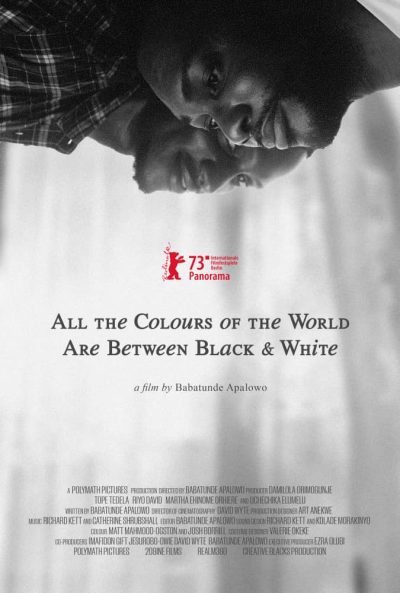
“All the Colours of the World Are Between Black and White” (Nigeria)
(4/5); Letterboxd (4/5), Imdb.com (8/10), TMDB.com (4/5); Web site Trailer
Despite the considerable social progress that the LGBTQ+ community has made in recent years, there are still some places around the world where the act of coming out is questionable and deeply troubling. In some cases, such a step raises serious issues about social acceptance, as well as self-preservation and legal ramifications. It may even prompt some individuals to doubt their genuine intuitive impulses about their natural inclinations just to be able to fit in. Such is the case in Nigeria, as depicted in the debut feature from writer-director Babatunde Apalowo, a Nigerian-born filmmaker based in the UK. In his first feature release, Apalowo tells the story of Bambino (Tope Tedela), a motorcycle deliveryman who meets and befriends Bawa (Riyo David), an aspiring photographer with whom he starts spending considerable time, a connection that carries implications greater than just friendship. However, given the country’s social taboos and illegality considerations, as well as sustained pressure from Efeyinwa (Martha Ehinome Orhiere), a neighbor who wants to become Bambino’s wife, the budding relationship between the two men remains at arm’s length. Bambino has doubts about his own sexuality, while Bawa believes that he and his new companion are destined for something deeper and more meaningful. But will that happen? The film probes this question as the two men tenuously circle one another, trying to figure out what’s next. Admittedly, the pacing here can be somewhat on the slow side at times, but that’s understandable given the circumstances under which they’re operating. But, by taking this approach, the filmmaker has an opportunity to present their story in a highly sensual way, one that creates ample sexual tension that’s fittingly augmented by the picture’s carefully framed shots, many of which allow the actors to convey tremendous depth of feeling merely with facial expressions and body language. The tone, message and style of filmmaking are all reminiscent of filmmaker Barry Jenkins’s Oscar-winning best picture “Moonlight” (2016), a perspective that carries significant ramifications in a culture that often denies the very existence of gay male individuals within its ranks. The film thereby provides a revelatory look into a segment of society that many don’t recognize, understand or acknowledge. Like this film’s American counterpart, however, it’s imperative that viewers have patience with this one, giving it time to develop and emerge with a story that’s heartfelt, eye-opening, and, above all, rewarding.
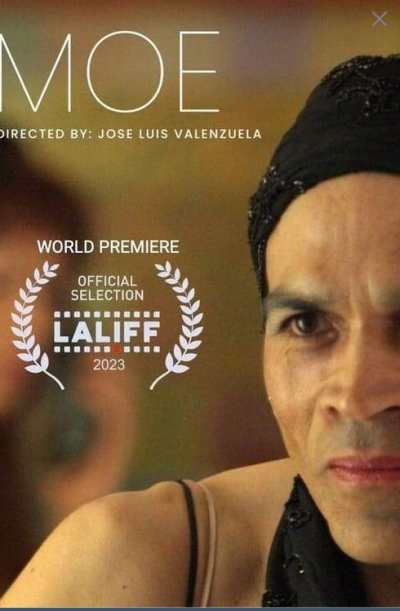
“Moe” (USA)
(4/5); Letterboxd (3.5/5), Imdb.com (7/10), TMDB.com (3.5/5); Web site
When Moises (a.k.a., “Moe”) (Sal Lopez), a gay theater director dying of AIDS, decides to throw a final farewell party for himself, things don’t quite turn out as planned. Surrounded by family (Tonantzin Esparza), longtime friends (Geoffrey Rivas, Danny De La Paz, Lucy Rodriguez) and an ex-wife (Evelina Fernández) whom he hasn’t seen in 15 years, this would-be celebration of life turns somewhat troubling with the revelation of long-hidden truths, a time for the release of secret pains, but also an opportunity for closure and redemption as the end draws near. As Moe’s story unfolds, the film takes on the character of a life review, with flashbacks that touch on his past, often “hosted” by his alter-ego, Lupe (Richard Coca), a drag queen cabaret chanteuse. Based on the award-winning stage play Dementia and filmed in 2005, director José Luis Valenzuela has at last been able to bring his long-held cinematic dream to the screen in a touching yet sometimes gut-wrenching tale filled with plenty of heartfelt moments and more than its share of biting wit. In some ways, the film plays like a gay version of “All That Jazz” (1979) with occasional touches of “Torch Song Trilogy” (1988) and “Angels in America” (2003) thrown in for good measure but without becoming shamelessly duplicative. Admittedly, the picture turns a little too melodramatic for its own good at times in the final act with the exposure of a few too many revelations that stretch the narrative’s credibility. A few production glitches show up now and then, too, detracting from the overall quality of what’s obviously a surprisingly well-made shoestring budget production. Otherwise, though, “Moe” is clearly a labor of love brought to life about a time when life itself is coming to an end, a story that’s economically told without becoming schmaltzy, manipulative or unduly campy in the process, which it easily could have been if left in less-skilled directorial hands. This offering may not be particularly easy to find, but it’s worth a look if the opportunity presents itself.

“Fireworks” (“Stranizza d’amuri”) (Italy)
(3/5); Letterboxd (3/5), Imdb.com (6/10), TMDB.com (3/5); Web site
Intolerance against members of the gay community has long been a theme in LGBTQ+ cinema, one that has become so common that it’s indeed familiar, if not overdone. However, when it’s set in a historical context, it can be valuable for illustrating how far this segment of society has come (and in a relatively short time, too), as well as a legacy instructional tool for younger members of the community. Such is apparently the intent behind writer-director Giuseppe Fiorello’s debut feature, a sincere effort at telling the fact-based story of a pair of teenage gay men (Gabriele Pizzuro, Samuele Segreto) in 1982 Sicily who face growing prejudice and harassment from locals and family members as their relationship begins to surface publicly. It’s a bittersweet heart-tugging tale of friendship, love, courage and undue bigotry that genuinely strikes a chord of sympathy with viewers. However, with a runtime of 2:13:00, it’s also needlessly long, especially at the outset, moving by at a snail’s pace that begins to grow tiresome by the film’s middle. The film also suffers from some uneven, inconsistent character development, making one wonder where some of its unexpected shifts in tone come from. Both of these issues are not entirely unexpected in the work of a first-time filmmaker, a creator who’s still learning about knowing when to “kill one’s darlings,” an error a little more than apparent here. Admittedly, the film finishes strongly in the final act, especially in its chilling conclusion. Nevertheless, the picture could have easily been cut by about 20 minutes without losing anything, and the director would have been wise to pursue that course (perhaps he will next time). It’s unfortunate that “Fireworks” ends up getting bogged down by its own narrative in light of the strength of its story and the importance of its message. We can never be reminded too much of where we’ve been so that we can avoid going back there again – and reliving the indignities that our predecessors had to endure.
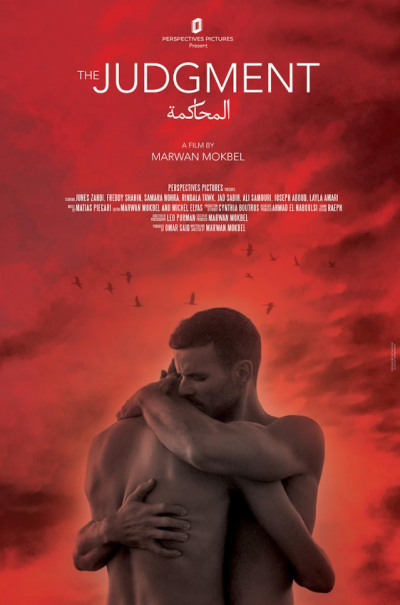
“The Judgment” (Egypt/Lebanon/USA)
(3/5); Letterboxd (3/5), Imdb.com (6/10), TMDB.com (3/5); Web site
When is something sinful, and when is it not? It’s hardly a clear-cut matter; what someone might see as perfectly acceptable is utter heresy for someone else, despite the fact that the same issue is up for debate in each of those cases. And it’s this question that’s explored in writer-director Marwan Mokbel Elessawi’s second feature outing about an Egyptian-American gay couple who visit the homeland to handle a family emergency and end up undergoing a frightening, unexpected supernatural experience. One of the partners, Mo (short for Mohammed) (Junes Zahdi), who has spent most of his life in the US and has had little contact with his family for years, is unaccustomed to the lack of tolerance he experiences compared to his life in America. Yet, despite sincere efforts to maintain a low profile, he soon discovers that there may be those who know about his “sinful” secret – and who seek to inflict evil deeds upon him for his allegedly wicked ways, experiences that prompt Mo to question his own behavior. But aren’t those gestures perpetrated against him innately as evil as what he’s supposedly guilty of? While these sanctimoniously accusatory acts are served up in the guise of witchcraft, the narrative draws upon them as metaphors for the narrow-mindedness of fanatical religious fundamentalism. These incidents thus place the beleaguered protagonist in a position of having to assess his beliefs about himself and what’s unfolding around him, issues that hearken back to his youthful upbringing and prompting him to examine his current behavior. The result is an admirably ambitious effort at exploring the key question raised above. Unfortunately, the picture doesn’t address it as clearly as it might have. While this offering starts out strong and finishes well, it stumbles in the middle, getting caught up in an array of confusing story threads that go on too long and ultimately yield more muddle than riddle. Although the film provides a detailed look at the rites and practices of Egyptian witchcraft, there’s a definite TMI quality about this that doesn’t allow the narrative’s symbolic elements to come across as unobstructed as they might have otherwise. I appreciate the sentiment that this one is going for, but it’s regrettable that it doesn’t carry it off as well as it might have. Indeed, it really is true that less can be more.
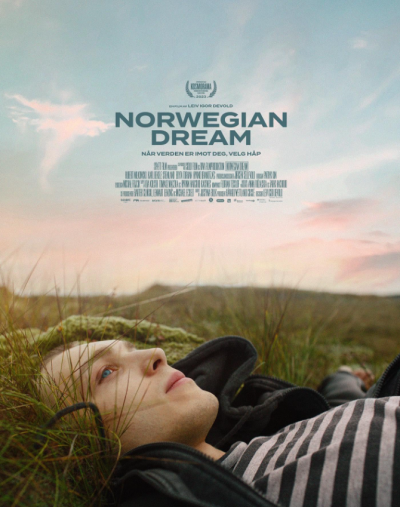
“Norwegian Dream” (Norway/Poland/Germany)
(3/5); Letterboxd (3/5), Imdb.com (6/10), TMDB.com (3/5); Web site Trailer
Coming out stories have become a staple of LGBTQ+ cinema over the years, and, through the years, these offerings have increasingly come to distinguish themselves by incorporating greater and more specific details about the circumstances under which these tales unfold. Adding such context has significantly helped these films establish themselves as stories that go beyond being works of fundamentally basic gay-themed cinema. However, by including these additional narrative elements, it’s become incumbent on the creators of these pictures to seek to harmoniously integrate these supplemental aspects into their stories to make them more complete offerings. Such appears to have been the intent behind director Leiv Igor Devold’s third feature outing, the story of a closeted laborer (Hubert Milkowski) who leaves his native Poland to take a job in Norway, hoping that he’ll find a more tolerant way of life compared to the bigoted attitudes prevalent in his homeland. Upon arrival, however, he finds adjustment difficult, partly because he’s unaccustomed to his newfound freedom and partly because of other challenges faced by immigrant workers, such as the bald-faced disrespect often inflicted on them, issues related to the difficulty involved in union organizing and seeking ways to balance his life in Norway with that of relatives back in Poland. All of these story threads have merit, too, but this release struggles to find an effective degree of integration, prompting the narrative to frequently wander as if lost in the Scandinavian woods. That’s unfortunate, given that all the makings of an engaging story are present here, but they never quite gel into a cohesive whole, leaving viewers wondering exactly what the filmmaker and script writers are actually going for. Granted, the film shines a bright light on the widely held illusion of a “Norwegian dream,” one that sadly seems to mirror its equally illusory American counterpart, but, that consideration aside, this tale ultimately raises more questions than it answers, leaving viewers as unsatisfied as its disillusioned protagonist. Indeed, staying put might not be the wisest decision for someone in need of making a change, but then an alleged panacea might not be the answer either. As ambitious as it might be to try to convey that notion cinematically, some things just don’t work out in the end, as this film illustrates.
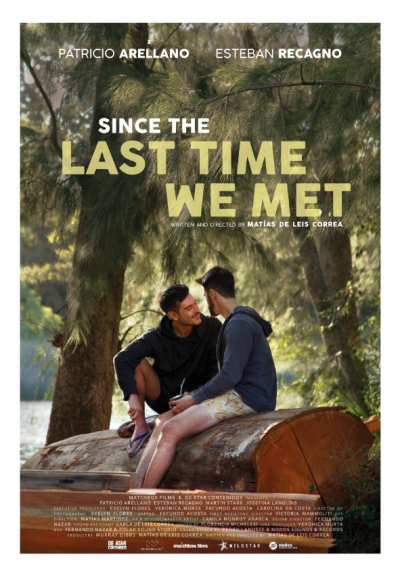
“Since the Last Time We Met” (“Desde la última vez que nos vimos”) (Argentina)
(2/5); Letterboxd (1.5/5), Imdb.com (3/10), TMDB.com (1.5/5); Web site Trailer
If you’re looking for a film about how not to conduct yourself in a gay male relationship, this is it. Writer-director Matías De Leis Correa’s second feature outing is a talky, jumbled mess about the dysfunctional reunion of two long-separated partners (Patricio Arellano, Esteban Recagno) who constantly paw at one another but can’t make up their minds about what they want for the future. In a story that pretentiously deals with the supposed power of love and unrestrained raw emotion, the film ends up being little more than an exercise in whiny, circular, often-contradictory discussions about relationships and responsibility as a precursor to soft-core gay male porn. The picture tries hard to pass itself off as a work of poetic, heartfelt romance but is in actuality little more than slickly produced justification for bad behavior. What’s more, the story grows ever more tedious as it unfolds, straining to evoke sympathy from audience members for the selfish expectations and doormat subservience of its two remarkably unlikable protagonists, plot devices that regularly and increasingly prompt sighs and reactions of “Oh, come on already!” While this release admittedly features some fine camera work of the Argentinean landscape, that’s about all it has going for it. But, considering that this is the work of a filmmaker primarily known for music videos, what can one really expect? This one is easily skipped.
Copyright © 2023, by Brent Marchant. All rights reserved.
Tune in for the latest Cinema Scribe segment on Bring Me 2 Life Radio, beginning Tuesday October 10, available by clicking here. You can also catch it later on demand on Spreaker, Spotify, Apple Podcasts, iHeartRadio, Podchaser, Audible, Deezer, Podcast Addict and Jiosaavn.
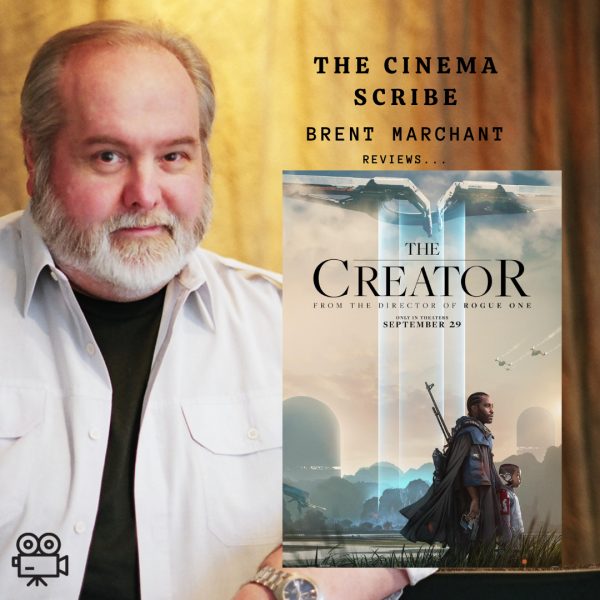

“The Creator” (2023). John David Washington, Madeleine Yuna Voyles, Gemma Chan, Allison Janney, Ken Watanabe, Sturgill Simpson, Robbie Tann, Marc Menchaca, Amar Chadha-Patel, Ralph Ineson, Veronica Ngo. Director: Gareth Edwards. Screenplay: Gareth Edwards and Chris Weitz. Story: Gareth Edwards. Web site. Trailer.
Needless to say, given what happened in Los Angeles, Americans feel threatened by New Asia’s continued use of AI. And years of a concerted effort to rebuild the devastated metropolis have only hardened the nation’s resolve to force their Far Eastern counterparts to give up on this technology. So, to bring about this change, the US military has spent years developing initiatives to bring New Asia to its knees on this question. Some of them have been overt, such as building NOMAD, a sophisticated aerial global security system that makes Ronald Reagan’s Strategic Defense Initiative look like a glorified cap gun. Others have been covert, such as the deployment of secret operatives in New Asia to gather intelligence about its AI research and development, identifying its chief scientists and their projects, as well as finding the locations of its R&D laboratories.
Heading up the US military’s most secret operation is Sgt. Joshua Taylor (John David Washington), who has been clandestinely scoping out New Asia’s principal research lab, all in hopes of finding Nirmata, the alleged chief architect of the enemy’s AI technology. When not carrying out his covert activities, Joshua lives what appears to be a fairly ordinary life with his pregnant wife, Maya (Gemma Chan). However, unbeknownst to Taylor, the US military suspects that his wife may be Nirmata’s daughter, and so, late one evening, an army strike force attacks their home in search of her. But, when Maya learns through this assault that her husband is an undercover operative, she runs off, only to be killed apparently during a NOMAD strike that’s part of the operation.

Taylor manages to survive the attack but is severely maimed. He returns to Los Angeles to recuperate and spends the next five years working on one of the city’s recovery crews, vowing to never again participate in any military operations. However, quite unexpectedly, he’s approached by two army officers, Gen. Andrews (Ralph Ineson) and Col. Howell (Allison Janney), who seek to recruit him for a new assignment overseas. Intelligence reports have revealed that Nirmata has supposedly created a super-weapon of some kind that could devastate the West, one developed at the lab Taylor had been investigating at the time of the military strike on his Asian home. Andrews and Howell want to tap Taylor for the assignment because he’s the only one familiar with the layout of the lab and would make the best candidate for leading an assault on the facility. He reluctantly agrees and before long is making his way back to the place he had hoped to never see again.
The assault on the lab doesn’t go quite as planned, but Taylor successfully manages to make his way into the facility. He quickly determines the location of the secret weapon, but what he finds is entirely unexpected – it’s a robotic child (Madeleine Yuna Voyles). She sits in a chair surrounded by toys and watching cartoons. Taylor can hardly believe what he sees. But he also soon discovers that this is no ordinary “child.”
With enemy forces advancing on his location, Taylor flees with the “weapon.” But what comes next? He decides to visit his old friend Drew (Sturgill Simpson), his former commanding officer and an AI expert who lives in the provincial capital. Taylor and the young simulant – whom he calls “Alphie” – thus take off on a perilous cross-country journey with enemy troops and his own surviving colleagues in pursuit, but he manages to make it to the capital unscathed. However, once there, after Drew examines the child, Taylor learns that Alphie has special powers and the ability to expand her capabilities, traits that make her potentially the most powerful weapon in the world – and the most highly sought-after commodity on the planet.
Taylor’s pursuers catch up with him not long thereafter, forcing him and Alphie on the run again. It launches the duo into an odyssey that brings them in touch with an old ally, Harun (Ken Watanabe), a simulant soldier who becomes Alphie’s de facto protector, and a series of surprising revelations about Maya and her past. These developments and others further up the ante for the reluctant fugitives. They must keep moving to avoid capture and to bring to light truths that have long been hidden about Alphie and the reasons for her creation, as well as some dirty little secrets about America’s real interest in suppressing AI technology. Can they survive this ordeal and make these revelations known to the world? It will ask much of Taylor and Alphie and subject them to a rollercoaster ride of events that constantly place them in peril.

There’s a long-held sentiment common in business and scientific circles (among others) that, if we possess the capability and desire to create something, why not do it? But is this truly a wise course to follow? Admittedly, following this path has led to the development of countless products, services and technologies that have made our world a better and more comfortable place. Consider the contributions of Thomas Edison, Nikola Tesla, Steve Jobs, the Wright Brothers and many others, just to name a few. But can we say the same of those who wrought nuclear capabilities, dangerous biological and pharmaceutical substances, and advanced weaponry systems? Indeed, just because we can do something, does that necessarily mean we should pursue it? As I wrote in my most recent book, Third Real: Conscious Creation Goes Back to the Movies, numerous movies have illustrated the potential issues associated with such manifestations, such as “Jurassic Park” (1993), “Ex Machina” (2014), “Young Frankenstein” (1974) and “Gremlins” (1984). Are these pictures overblown exercises in paranoia, or are they cautionary tales we’d be wise to heed? And, in light of the recent and rapid proliferation of artificial intelligence, do they carry messages that we should apply to the emergence of this new technology?
Much depends on what we believe about the risks and merits of AI, and that’s crucial to consider given the role that our beliefs play in the manifestation of such materializations in our existence. Such is the core principle underlying the conscious creation process, the philosophy that maintains we draw upon the power of our thoughts, beliefs and intents in bringing about the reality around us. It’s unclear how many of us are aware of this school of thought, but, when we consider all that we’ve achieved as a species, its impact should be fairly apparent – and give us pause to think about how we apply it when charting new turf.
That’s particularly true where our intents are concerned, and it’s a key aspect of the message in “The Creator.” As the film observes, the proponents of artificial intelligence in this story apparently went about applying this technology to virtually everything and seemingly without thinking through the potential consequences, a practice often referred to as un-conscious creation or creation by default, where the ends outweigh whatever possible side effects might result from blindly following through on the manifestation of our beliefs. It’s akin to putting on a blindfold and getting behind the wheel of a car before going out for a drive. Who would realistically do that? Yet it’s astounding how often so many of us engage in comparable pursuits. Is that wise for someone playing a creator role in any kind of venture?
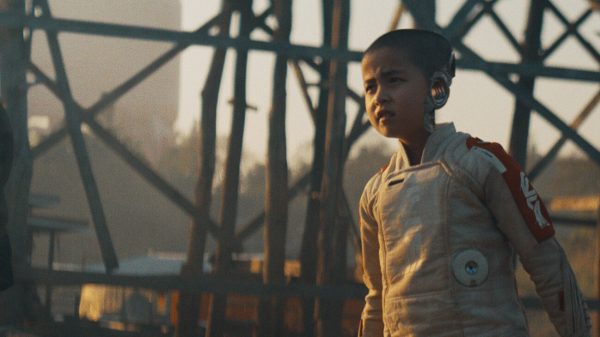
Those side effects are especially worrisome, because, no matter how thoroughly we may think we’ve thought things through, there’s always the possibility that we may have overlooked something, such as beliefs that are inherently part of our creations that we don’t recognize. It’s as if such notions come along for the ride without us being aware of them, yet they’re part of the belief mix that goes into the realization of these manifestations. And, because of this, there’s the possibility that they don’t belong there, that they can unwittingly contaminate or undermine the larger materializations that are being sought.
This should be particularly concerning when it comes to its inclusion in something like artificial intelligence, something we assume is based on logic and reason. But what if the rationale behind this technology is tainted by beliefs and intents that don’t strictly follow the rules of such concepts? What if we inadvertently incorporate notions associated with illogical considerations, such as unchecked emotions or elements of human failings? That’s ultimately not much different from the act of poisoning the well, and, if it’s allowed to be brought into being, it may be difficult to unscramble the egg, perhaps even resulting in incidents like the seminal event that sets off the storyline in this film. Talk about human error.
One of the points that this picture seriously encourages us to examine can be found right in its title. By developing AI, it’s highly plausible that we take on the role of “creator” in a context not unlike what we find in the religions of the world. The tremendous power of our beliefs and intents in a context like this can indeed be invoked to create something of incredible potency, persistence and influence. And that materialization will invariably be imbued with whatever characteristics we put into it, for better or worse and whether or not we’re aware of all of them. Unfortunately, if something that’s not in our best interests makes its way in, we may not find out about it until it’s too late.
A chilling example of this can be seen in the movie “2010: The Year We Make Contact” (1984), sequel to the cinematic classic “2001: A Space Odyssey” (1968). In this follow-up offering, computer scientist Dr. Chandra (Bob Balaban) investigates why one of his AI creations, the highly sophisticated HAL 9000 computer, malfunctioned with serious consequences while on a space mission to Jupiter nine years earlier. Through this inquiry, Chandra learns that the computer had been reprogrammed by parties with their own agenda – without his knowledge – to carry out orders that contradicted HAL’s basic software. This change left the computer with a quandary that it was unable to resolve, given that these instructions violated its programming. This revelation thus prompted Chandra to sadly observe that his creation had been instructed to lie by people who find it easy to lie. That’s truly tragic. And, if something like that could happen in fictional pieces like “2001” and “2010,” who’s to say that it couldn’t happen in a real-life setting as well? “The Creator” seeks to make that very point through its own narrative, and it’s advice we should take to heart.

When undertaking such endeavors, it’s essential that we recognize the inherent responsibility associated with them, a concept that we as humans often have difficulty embracing. As illustrated here, when artificial intelligence supposedly lets us down, we tend to blame the technology for its failings. But is this fair? After all, who created the technology in the first place? That’s quite a sobering thought – and one that “The Creator” fervently urges us to ponder before it’s too late. That’s especially true now as AI continues to gain a greater foothold in our existence. Let’s hope we have the wisdom to develop it so that it doesn’t do the unthinkable to us. Of course, for that to happen, we have to put in the necessary thought up front to prevent such troubling possibilities from emerging in the first place.
The question of responsibility applies on multiple levels in this film. In addition to the sanctity of the technology’s development, the picture also addresses responsibility from the standpoint of how we apply it, namely, in our intentions related to the sovereignty and sentience of the AI beings we have created. If simulants have genuinely attained their own degree of consciousness, is it fair to prevent them from using it to their fullest capacity, or are they merely to be treated as slaves to serve human needs? Is it responsible of us to create them as sentient beings only to keep them chained for the fulfillment of our own capricious wishes and desires?
Likewise, matters of responsibility are also raised in the nature of diplomatic and economic relations between America and New Asia. Is the conflict between them really based on the existence of AI technology, or is this a proxy excuse for something more clandestine and insidious, such as which of these powers is destined to come out on top as the alpha dog of the world? What’s more, can the supposedly ethical Americans be relied upon to keep their word to the planet about their alleged abandonment of artificial intelligence? For instance, their NOMAD global security system sure doesn’t look like it’s run on punch cards and floppy disks. Indeed, how sincere is their intent to this commitment? And, to boot, isn’t it possible that such insincere intents can make their way into the programming of this and other comparable technologies? Where is the responsibility in that?
It’s important to recognize and honestly address all of the foregoing considerations. If we don’t, the applications we create from employing tainted intents could seriously come back to bite us in our collective posteriors. Is that progress? Is that what this technology is all about? If we can’t answer those questions truthfully, maybe we’d better go back and review and revise our thinking.

The development of artificial intelligence has given us much to think about. Writer-director Gareth Edwards’s latest feature offering covers a great deal of ground related to the subject technologically, ethically and geopolitically, providing viewers with a poignant metaphor for all of these areas, the examination of which grows progressively stronger and more impressive as the story plays out. However, in the film’s prologue and opening act, the narrative comes across like a somewhat uninspired amalgamation of sci-fi tropes culled from an array of other movies and TV series, including “Blade Runner” (1982), “Edge of Tomorrow” (2014), “Oblivion” (2013), “I, Robot” (2004), “Midnight Special” (2016), “The Terminator” franchise and the rebooted version of Battlestar Gallactica (2004-2009), among others. Also, the story, much of which consists of an involved high-stakes pursuit, is overly stretched out at times, a plot element that could have been improved upon with some judicious editing. To its credit, though, the picture features excellent special effects, a fair amount of smartly written comic relief and a surprisingly good cast for a sci-fi release (particularly Washington and youthful newcomer Voyles, despite the serious miscasting of Janney for a role for which she’s ill-suited). “The Creator” is indeed more insightful and thought-provoking than what many of its detractors have said, though it’s understandable how its periodic lapses in originality and inventiveness may be seen as undermining these strengths. Nevertheless, these shortcomings should be taken with a grain of salt, and the film should be given a fair shot for what it has to say about something that’s becoming an increasingly more significant aspect of our lives, something that we had better to learn to understand and live with if we hope to make friends with it as part of our existence going forward. The film is playing theatrically.
Famed author and visionary Arthur C. Clarke once observed, “As our own species is in the process of proving, one cannot have superior science and inferior morals. The combination is unstable and self-destroying.” He illustrated that point in his own works, “2001” and “2010,” and director Edwards echoes those notions here. If those sentiments keep coming up in the zeitgeist as often as they do, then maybe they’re something worth listening to while we still have the time and wherewithal to do so.
Copyright © 2023, by Brent Marchant. All rights reserved.